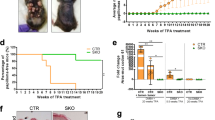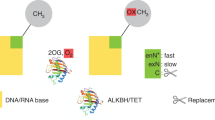Abstract
THE induction of tumours by dimethylnitrosamine and N-methyl-N-nitrosourea is thought to be initiated by the methylation of cellular constituents1–3. Recent results have suggested that a critical product produced by these carcinogens and their ethyl analogues might be O6-alkylguanine in DNA2–5. Organs relatively resistant to the carcinogenic stimulus provided by these agents seem to have a greater ability to remove this alkylated purine from their DNA than more sensitive tissues5–8. The activity of the system responsible for the removal of O6-methylguanine from DNA may, therefore, play an important part in determining whether tumours are produced. The ability to remove O6-methylguanine from DNA in rat kidney and liver showed a striking change in response to the dose of carcinogen administered. Large single doses of dimethylnitrosamine (20 mg per kg body weight or greater) which produce renal tumours in rats1,2 led to almost complete cessation of the excision of this product from kidney DNA8. In the rat liver removal of O6-methylguanine still occurred after high doses of dimethylnitrosamine or N-methyl-N-nitrosourea but was much less efficient than after smaller doses9–11. All of the studies summarised above were carried out by following the persistence of labelled O6-alkylguanine in DNA in vivo following administration of radioactive N-nitroso-compounds. This report describes a comparison of the abilities of extracts derived from liver and kidneys of control rats and rats pretreated with dimethylnitrosamine to catalyse the loss of O6-methylguanine from acid-precipitable DNA in vitro.
This is a preview of subscription content, access via your institution
Access options
Subscribe to this journal
Receive 51 print issues and online access
$199.00 per year
only $3.90 per issue
Buy this article
- Purchase on Springer Link
- Instant access to full article PDF
Prices may be subject to local taxes which are calculated during checkout
Similar content being viewed by others
References
Magee, P. N. & Barnes, J. M. Adv. Cancer Res. 10, 163–246 (1967).
Magee, P. N., Montesano, R. & Preussman, R. in Chemical Carcinogens, ACS Monograph Series 173 (ed. Searle, C. E.) 329–420 (American Chemical Society, Washington D. C., 1976).
Singer, B. J. Toxicol. environ. Hlth 2, 1279–1295 (1977).
Lawley, P. D. Mutat. Res. 23, 283–295 (1974).
Pegg, A. E. Adv. Cancer Res. 25, 195–269 (1977).
Goth, R. & Rajewsky, M. Z. Krebsforsch 82, 37–64 (1974).
Margison, G. P. & Kleihues, P. Biochem. J. 148, 521–525 (1975).
Nicoll, J. W., Swann, P. F. & Pegg, A. E. Nature 254, 261–262 (1975).
Kleihues, P. & Margison, G. P. Nature 259, 153–155 (1976).
Pegg, A. E. J. natn. Cancer Inst. 58, 681–687 (1977).
Pegg, A. E. & Hui, G. Biochem. J (in the press).
Giles, K. N. & Myers, A. Nature 206, 93 (1965).
Kirtiker, D. M. & Goldthwait, D. A. Proc. natn. Acad. Sci. U.S.A. 71, 2022–2026 (1974).
Author information
Authors and Affiliations
Rights and permissions
About this article
Cite this article
PEGG, A. Dimethylnitrosamine inhibits enzymatic removal of O6-methylguanine from DNA. Nature 274, 182–184 (1978). https://doi.org/10.1038/274182a0
Received:
Accepted:
Issue Date:
DOI: https://doi.org/10.1038/274182a0
This article is cited by
-
Effect of N-nitrosamines carcinogenic for oesophagus on O6-alkyl-guanine-DNA-methyl transferase in rat oesophagus and liver
Journal of Cancer Research and Clinical Oncology (1986)
-
Repair and replication of DNA in rat brain and liver during foetal and post-natal development, in relation to nitroso-alkyl-urea induced carcinogenesis
Journal of Cancer Research and Clinical Oncology (1984)
-
O6-methylguanine repair in liver cells in vivo: Comparison between G1- and S-phase of the cell cycle
Journal of Cancer Research and Clinical Oncology (1984)
Comments
By submitting a comment you agree to abide by our Terms and Community Guidelines. If you find something abusive or that does not comply with our terms or guidelines please flag it as inappropriate.



